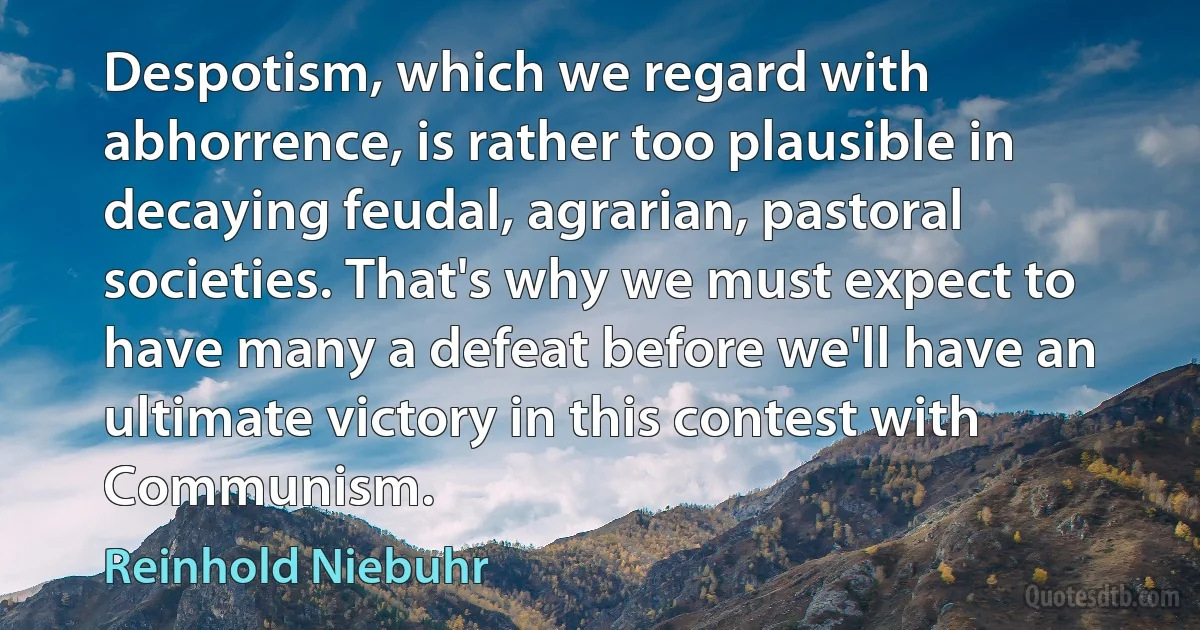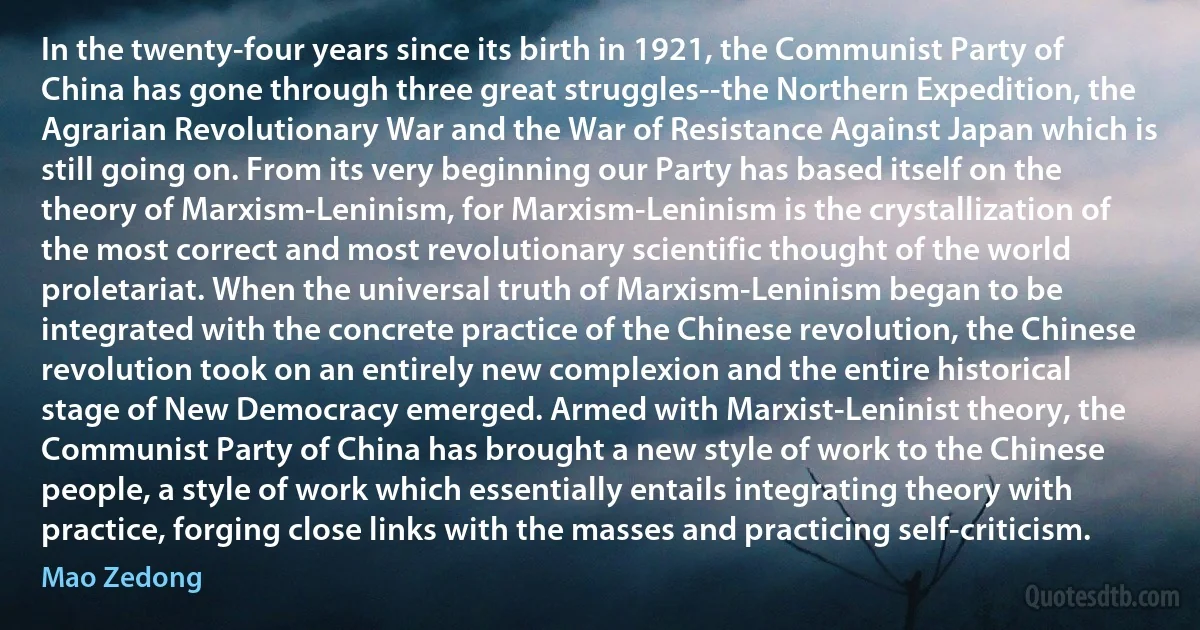Agrarian Quotes
It is this which explains nationalism: the principle - so strange and eccentric in the age of agrarian cultural diversity and the 'ethnic' division of labour - that homogeneity of culture is the political bond, that mastery of (and, one should add, acceptability in) a given high culture ... is the precondition of political, economic and social citizenship.

Ernest Gellner
Our only crime consisted of decreeing our own laws and applying them to all without exception. Our crime is having enacted an agrarian reform which effected the interests of the United Fruit Company. Our crime is wanting to have our own route to the Atlantic, our own electric power and our own docks and ports. Our crime is our patriotic wish to advance, to progress, to win economic independence to match our political independence. We are condemned because we have given our peasant population land and rights.

Jacobo Arbenz Guzmán
The more I think about it, the more obvious it becomes to me that the Poles are une nation foutue [a fucked nation] who can only continue to serve a purpose until such time as Russia herself becomes caught up into the agrarian revolution. From that moment Poland will have absolutely no raison d'étre any more. The Poles' sole contribution to history has been to indulge in foolish pranks at once valiant and provocative. Nor can a single moment be cited when Poland, even if only by comparison with Russia, has successfully represented progress or done anything of historical significance.

Friedrich Engels
Our agrarian revolution has been a process in which the landlord class owning the land is transformed into a class that has lost its land, while the peasants who once lost their land are transformed into small holders who have acquired land, and it will be such a process once again. In given conditions having and not having, acquiring and losing, are interconnected; there is identity of the two sides. Under socialism, private peasant ownership is transformed into the public ownership of socialist agriculture; this has already taken place in the Soviet Union, as it will take place everywhere else. There is a bridge leading from private property to public property, which in philosophy is called identity, or transformation into each other, or interpenetration.

Mao Zedong
Out of the beliefs nourished by the agrarian myth there had arisen the notion that the city was a parasitical growth on the country. Bryan spoke for a people raised for generations on the idea that the farmer was a very special creature, blessed by God, and that in a country consisting largely of farmers the voice of the farmer was the voice of democracy and of virtue itself. The agrarian myth encouraged farmers to believe that they were not themselves an organic part of the whole order of business enterprise and speculation that flourished in the city, partaking of its character and sharing in its risks, but rather the innocent pastoral victims of a conspiracy hatched in the distance. The notion of an innocent and victimized populace colors the whole history of agrarian controversy, and indeed the whole history of the populistic mind.

Richard Hofstadter
Merchants and Revolution, dedicated to Stone, comprehensively overturns that judgement. Its author, Robert Brenner, belongs to that rare group of historians who have given their name to a whole literature – the ‘Brenner Debate' on the origins of agrarian capitalism in Europe recalling the ‘Pirenne Thesis' of old. His new book, in which the name of Marx is never mentioned but his spirit is omnipresent, transforms the landscape of the English Revolution. Merchants and Revolution is distinguished by three achievements, any one of which would be impressive enough. Together, their combination is an extraordinary feat.

Perry Anderson
The destruction of the old bonds between employers and workmen was not peculiar to manufactures; it came to pass in agriculture also. An agrarian as well as an industrial revolution had taken place. Scientific methods of cultivation had been substituted for unscientific; vast enclosures had been made; traces of the old three-field system of apportioning the land were fast disappearing; small farms were giving way to large. A new race of farmers, corresponding to the new race of manufacturers, had sprung into existence, who, enriched by the high prices which prevailed during the great war, changed their habits of life. The labourer ceased to be a member of the farmer's household, and, to use Cobbett's words, was thrust out of the farm-house into a hovel.

Arnold Toynbee
The post-1945 urge for change went well beyond the provision of welfare. The years following World War Two were a sort of foreshortened Age of Reform, during which many long-pressing problems were belatedly addressed. One of the most important of these was the matter of agrarian reform, which many well-informed contemporaries saw as Europe's most pressing dilemma.

Tony Judt
U.S. activists are always enthusiastic about and do solidarity work for agrarian uprisings in Latin America, such as the Zapatistas and the previous national liberation movements that had agrarian reform/revolution as their bases. But, they have not taken the time and made the commitment to understand indigenous and other agrarian struggles in the United States. Even the Civil Rights Movement in the South was weakened by not taking up the issue of land, and when voting rights were achieved organizers fled north and west to work in urban areas.

Roxanne Dunbar-Ortiz


